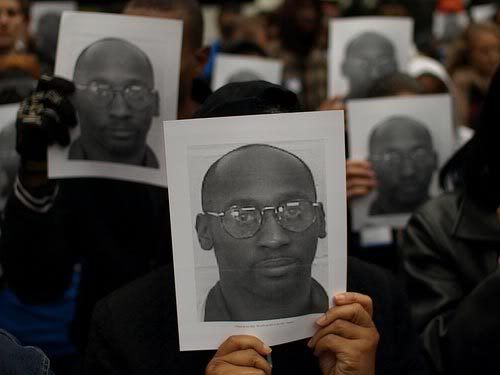March 18 marked the fiftieth anniversary of Gideon v. Wainwright, the landmark case by the Supreme Court that required states under the 14th amendment to provide counsel in criminal cases for defendants who are unable to afford to pay their own attorneys, extending the identical requirement made on the federal government under the 6th Amendment.
But is justice now equal?
The Legacy of Gideon v. Wainwright
by John Light, Moyers & Company
Anthony Lewis, The New York Times journalist whose masterwork chronicled the Supreme Court’s landmark Gideon v. Wainwright decision, died earlier this week at the age of 85. The court’s ruling, handed down 50 years ago last week, established a criminal defendant’s right to an attorney, even if that defendant cannot afford one. [..]
Here are some resources on Anthony Lewis and the legacy of Gideon v. Wainwright.
1. Gideon’s Trumpet
In 1964, Lewis, a two-time Pulitzer Prize winner, published his book Gideon’s Trumpet. In it, he described Clarence Earl Gideon as a wrongly convicted Florida man convinced that he was entitled to legal representation even though the state of Florida said otherwise. [..]
2. Defending Gideon
A new documentary from The Constitution Project and the New Media Advocacy Project examines the impact of Gideon v. Wainwright and includes a recent interview with Anthony Lewis as well as an archival interview from the 1960s with Gideon, who explains that he was surprised to hear from the trial judge that he was not entitled to a lawyer. [..]
3. “The Silencing of Gideon’s Trumpet”
Ten years ago, on the 40th anniversary of Gideon v. Wainwright, Lewis described in The New York Times Magazine the “endless failures to bring the promise of Gideon to life.” He wrote, “Even more alarming is the assertion by the Bush administration that in a whole new class of cases it can deny the right to counsel altogether. [..]
4. Adam Liptak on Lewis’s Transformative Journalism
Adam Liptak, one of Lewis’s successors as Supreme Court correspondent for The New York Times, wrote the paper’s obituary of its former reporter and columnist. He noted that Gideon’s Trumpet has never been out of print from the day it was published, and that Lewis’s knowledgeable and thorough coverage of the court during the years Earl Warren served as its chief justice made him almost as essential to its history as the judges themselves. [..]
5. Andrew Cohen on Lewis and Gideon today
Writing in The Atlantic earlier this month, legal scholar Andrew Cohen described how, in the story of Gideon v. Wainwright, Lewis found material for one of the “best nonfiction works written about the Supreme Court and the American legal system.” [..]
But the thrust of Cohen’s essay is that Gideon’s legacy has not fared so well. A Brennan Center for Justice report found that many court appointed lawyers are overworked and spend less than six minutes per case at hearings where they counsel their clients to plead guilty. Lawmakers haven’t funded public defenders adequately, Cohen says, and the Supreme Court has not required them to do so.
On March 29th’s Moyers & Company, host Bill Moyers discussed the system’s failures, and ongoing struggles at the crossroads of race, class and justice with attorney and legal scholar Bryan Stevenson. Then Mr. Moyers is joined by journalists Martin Clancy and Tim O’Brien, authors of Murder at the Supreme Court, to examine the fatal flaws of the death penalty.
The broadcast closes with a Bill Moyers Essay on the hypocrisy of “justice for all” in a society where billions are squandered for a war born in fraud while the poor are pushed aside.
Full transcript can be read here




Recent Comments